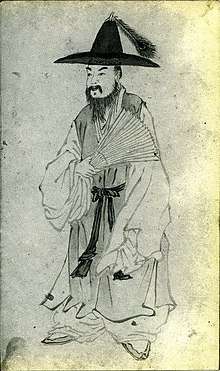Bak Jega
Bak Jega (Korean: 박제가; Hanja: 朴齊家; 1750–1805) was a scholar of school of Practical learning (Silhak) in the late Joseon Dynasty.[1] He was a student of Park Ji-won.
| Bak Jega | |
 Bak Jega (1790) | |
| Korean name | |
|---|---|
| Hangul | 박제가 |
| Hanja | |
| Revised Romanization | Bak Jega |
| McCune–Reischauer | Pak Cheka |
| Pen name | |
| Hangul | 초정 |
| Hanja | |
| Revised Romanization | Chojeong |
| McCune–Reischauer | Ch'ojŏng |
Background
Bak Jega was a famous Silhak scholar in the late Joseon Dynasty. He was a student of another famous Silhak scholar, Park Ji Won. Bak Jega was born in 1750 and died in 1815. Bak Jega went to Qing (also referred to as "Ching"), which was the name of China at that time, after becoming a student of Park Ji Won. He learned about China’s modern culture, advanced techniques, and its economic system while there. After returning from Qing, Park Ji Won worked in Jiphyeonjeon, a place where important scholars and scientists worked, during the time of King Jeongjo.
Legacy
Because the Joseon government supported ‘Yuhak', a neo-Confucianist conservative ideology, Bak Jega had an important role and his desire was to make Joseon rich in science and commerce.
He authored several books; the compilation is titled, Jeongyungyp. He wrote about making the commerce system stronger in Umyoungnomchogo and Gunyeonjib. At that time, it was quite shocking to believe in Silhak, whose ideas opposed Yuhak.
Bak Jega developed the way of agriculture, and he also enhanced some of the farming machinery to cultivate plants.
Bukhak theory
He argued that using the cart to develop local commerce and at the same time develop strong ships to actively enter foreign trade in his book, <Bukhakui>. He called for improving the reality and proactively embracing the culture of the Qing Dynasty. He argued for the abolition of Joseon's status system, and considered commerce and industry important. He said, " If we actively take advantage of the natural environment of Joseon, which is surrounded by the sea on three sides, and develop it into maritime trade, the national power will become strong and the livelihood of the people will be stabilized." [2]
Books
- Bukhagui (북학의 北學議) :
- Jeongyujip (정유집 貞否集)
- Myeongnongchogo (명농초고 明農草稿)
- Hangaekgeonyeonjip (한객건연집 韓客巾衍集)
- Sigo (시고 詩稿)
- Muyedobotongji
References
- Pyŏng-man An (2003). Elites and political power in South Korea. Edward Elgar Publishing. p. 43. ISBN 978-1-84064-971-0.
- 경기일보, (Kyeonggi Daily). "[실학, 조선의 재건을 꿈꾸다] 20. 북학으로 조선을 재건하자_초정 박제가". 경기일보 (in Korean). Retrieved 2018-04-28.
Further reading
- Kim Haboush, JaHyun and Martina Deuchler (1999). Culture and the State in Late Chosŏn Korea. Cambridge: Harvard University Press. ISBN 9780674179820; OCLC 40926015
- Lee, Peter H. (1993). Sourcebook of Korean Civilization, Vol. 1. New York: Columbia University Press. ISBN 9780231079129; ISBN 9780231079143; ISBN 9780231104449; OCLC 26353271
- Noh, Daehwan. "The Eclectic Development of Neo-Confucianism and Statecraft from the 18th to the 19th Century," Korea Journal. Winter 2003.
External links
- 우린 아직 박제가를 모른다 조선일보 2010.02.23
- 중상학파 (重商學派)
- 1997년 08월의 문화인물:초정 박제가(楚亭 朴齊家)